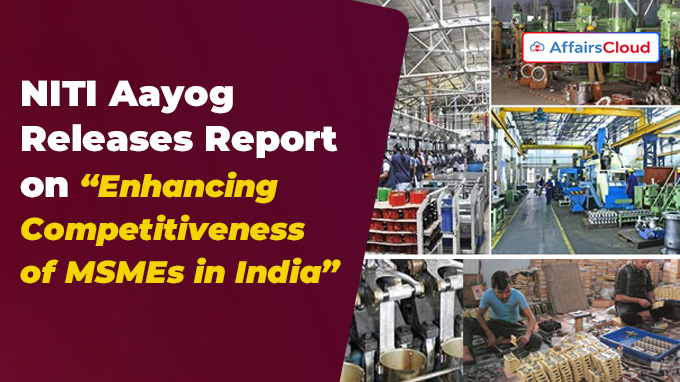 On May 2, 2025, the Government of India’s (GoI) policy think tank, National Institution for Transforming India (NITI) Aayog, in collaboration with the Gurgaon (Haryana)- based Institute for Competitiveness (IFC), released a comprehensive report titled ‘Enhancing MSMEs Competitiveness in India’.
On May 2, 2025, the Government of India’s (GoI) policy think tank, National Institution for Transforming India (NITI) Aayog, in collaboration with the Gurgaon (Haryana)- based Institute for Competitiveness (IFC), released a comprehensive report titled ‘Enhancing MSMEs Competitiveness in India’.
- The report provides a strategic roadmap to unlock the potential of India’s Micro, Small, and Medium Enterprises (MSMEs) through systemic reforms in financing, skilling, innovation, and market access.
- It highlights that MSMEs contribute 30.1% to India’s Gross Value Added (GVA) and account for 45.79% of total exports, valued at Rs. 12.39 lakh crore in 2024-25.
Highlights of the Report:
1.Credit Access and Financial Gaps:
i.Between 2020 and 2024, the proportion of Micro and Small Enterprises(MSEs) accessing credit through scheduled banks increased from 14% to 20%, while medium enterprises saw an increase from 4% to 9%.
ii.Despite this improvement, only 19% of MSME credit demand was met formally by Financial Year 2020-21 (FY21), leaving an estimated Rs. 80 lakh crore unmet.
iii.The report recommends overhauling the Credit Guarantee Fund Trust for Micro and Small Enterprises (CGTMSE) to enhance regulatory oversight, reduce premium rates, and increase coverage, especially for women-led enterprises.
2.Sector-Specific Focus:
i.The report delves into four critical sectors: textiles manufacturing and apparel, chemical products, automotive, and food processing.
ii.It identifies sector-specific challenges and opportunities to enhance MSME competitiveness within these industries.
3.Skilling and Technology Adoption Challenges:
i.A significant portion of the MSME workforce lacks formal vocational or technical training, hindering productivity and scalability.
- The report emphasizes the need for accessible skill development initiatives, particularly for MSMEs in remote areas.
ii.About 35% of MSME clusters struggle with unreliable electricity, along with weak internet connectivity and high technology costs.
- The report urges state governments to improve basic infrastructure and promote affordable digital solutions to strengthen MSME supply chains.
4.Policy Implementation and Awareness:
i.The report highlights gaps in the implementation of national and state policies and limited awareness among MSMEs.
ii.It recommends stronger state-level design and implementation, consistent monitoring, better data integration, and improved stakeholder engagement.
NITI Aayog & GAME Partner to Boost Local Entrepreneurship Ecosystems in India
On May 2, 2025, the National Institution for Transforming India (NITI Aayog) and the Bengaluru (Karnataka)-based Global Alliance for Mass Entrepreneurship (GAME) announced a strategic collaboration to foster entrepreneurship ecosystems across India.
- The initiative will begin with pilot projects in Nagpur (Maharashtra), Visakhapatnam (Andhra Pradesh, AP), and Uttar Pradesh (UP), focusing on place-based interventions to empower local entrepreneurs.
Key Focus Areas:
i.The partnership will unite government bodies, corporates, educational institutions, financial institutions, entrepreneurs, and community organizations to address regional challenges.
ii.Tailored strategies will be developed to enhance access to finance, capacity-building programs, policy advocacy, and community-driven initiatives.
iii.Under this partnership, the pilot sites will implement GAME’s established methodologies that focus on enabling entrepreneurs to start and scale businesses.
- Key interventions include: Access to finance, Capacity-building programs, Policy advocacy and Community-driven initiatives.
About Global Alliance for Mass Entrepreneurship (GAME):
GAME is a non-profit organization dedicated to catalyzing a nationwide movement of mass entrepreneurship in India.
Founder & Chairperson – Ravi Venkatesan
Headquarters – Bengaluru, Karnataka
Established – 2018
About National Institution for Transforming India (NITI) Aayog:
Chief Executive Officer (CEO) – B.V.R. Subrahmanyam
Headquarters – New Delhi, Delhi
Established – 2015




